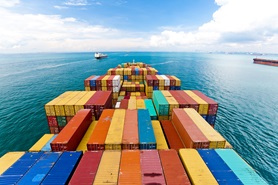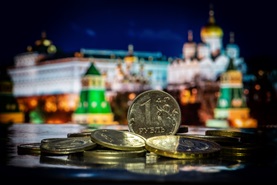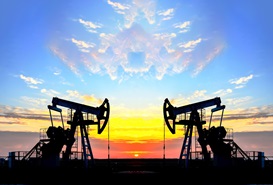Climate Change, Innovation, and Cybersecurity in the Defense Industry: New Opportunities for ESG Investors
While perhaps not a widely considered link between the defense industry and climate change, several Eurosatory conference sessions addressed how climate change can intensify security risks and threats.
Applying Business and Human Rights International Standards to Investor Due Diligence
Socially conscious ESG investors are interested in how to implement international business and human rights norms in their portfolios and understand the potential impacts of applying additional screening criteria within their strategy.
Why ESG Investors Follow the Elon Musk Twitter Takeover
A self-proclaimed “free speech absolutist”, Musk has criticized what he views as excessive moderation on online platforms, indicating his desire to ease Twitter’s content moderation policies and only remove content deemed illegal by governments.
Ocean Carriers Facing Increased ESG Risk Amidst Supply Chain Crisis
Maritime shipping is the most common mode of transport for global trade, with around 80-90% of the volume of international trade in goods carried by sea. Complex supply chain challenges around the world made 2021 an exceptionally challenging year for retailers, exacerbating global inflation. Still, it was also very profitable for ocean carriers and containership owners.
Correlation of Business Ethics and Corporate Culture - 5 Lessons from the Banking Industry
To protect a company’s reputation and economic position, its employees play an essential part in organisational risk mitigation strategy by demonstrating consideration for systemic business risk, taking accountability, and being willing to escalate concerns. Companies with a strong, ethical corporate culture have much to gain—improved employee performance, morale, and retention, and in the long run, bolstering the bottom line.
The Governance of Autonomous Weapons: What Investors Should Know
The ethical implications of lethal autonomous weapons systems (LAWS), often referred to by their dramatic moniker ‘killer robots’, have long been a topic of interest. Until recently, debates about LAWS were relegated as hypothetical, with the technology assumed to be under development and out of reach. Such assumptions may be due for reevaluation, and while a firm conclusion is yet to be drawn, it is worthwhile presenting them to the ESG investment community.
Russia-Ukraine Crisis Could Spell Unforeseen ESG Risks for Insurers
The Russia-Ukraine conflict and the subsequent sanctions on Russian entities have led to material and wide-ranging impacts on diversified sectors and international firms. However, company disclosures and other sources suggest that the conflict’s primary impact on the global insurance industry is limited for two main reasons
ESG Implications of Russia’s Invasion of Ukraine on the Aviation and Defense Sectors
The aviation industry is feeling the impact of rising fuel costs as an immediate repercussion of the conflict in Ukraine. In particular, the airline sector is still facing significant challenges in mounting a steady recovery from the COVID-19 crisis. On the other hand, the defense industry may be presented with opportunities in light of increased government spending in the aftermath of the invasion.
Banks’ ESG Risks Related to the Russia-Ukraine Conflict on Investors’ Radars
Investor interest in the banking sector remains high as the impact of Russian sanctions unfolds. Based on Morningstar Sustainalytics’ research, total unmanaged risk has increased for both Russian and international banks with exposure to Russian clients. To what extent have sanctions affected banks’ total unmanaged risk?
ESG Impacts of the War in Ukraine: Global Food Supply
The invasion of Ukraine highlights the fragility of the global food system. The destruction caused by the war and subsequent trade restrictions on Russia, endangers a significant percentage of the global food supply coming from two of world’s leading agricultural commodity exporters, consequently prompting food prices to surpass the 30-year high.
Mass Timber in Construction - Big Buildings, Smaller Carbon Footprint
As an innovation in the industry, mass timber construction emits significantly less carbon than traditional concrete and metal structures, while modular construction ensures usability across many building types. This article reviews some of the concerns over structural strength, fire safety, regulatory compatibility, cost savings and the sustainability of increased forestry. It then examines current mass timber buildings and projects and looks at their viability as an alternative material for the future.
Russia, ESG Risks in Energy, and Corporate Citizenship
As the unprecedented situation in Ukraine continues to unfold, Russia’s energy industry has remained remarkably untouched by the waves of sanctions currently being deployed against the country, despite being arguably its most important sector. While the European Union and its allies have been cautious to avoid disrupting energy flows (unlike how sanctions are currently disrupting the flow of capital), international oil companies are responding to the crisis in their own capacity.
The ESG Risks of National Oil Companies Taking Over Fossil Fuel Production from International Oil Majors
As growing pressure to cut GHG emissions is causing Western oil majors to sell their high-carbon assets, it is expected that National Oil Companies (NOCs) will pick up some of the production. For investors holding an interest in or considering investing in NOCs or sovereign debt, it is worth assessing how fossil fuel production shifts will impact their portfolio’s alignment with climate ambitions and ESG values.
The Impact and Cost of Air Pollution: U.S. Petroleum Refineries
Investors can examine to what extent petroleum refiners manage their Non-GHG Air Emissions and assess the quality of a company's programs to reduce air pollutants. For instance, examining all the petroleum refiners assessed by Sustainalytics, we observe that only 3% have a strong program to manage non-greenhouse gas emissions.




















